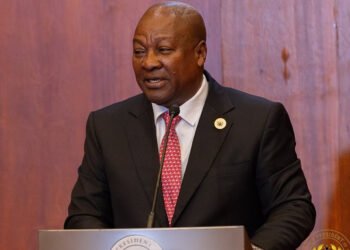The Ministry of Lands and Natural Resources has responded to intensifying calls for a state of emergency over illegal mining, stressing that while the concerns are valid, ongoing interventions are already delivering positive results in addressing the menace.
The clarification follows a protest by members of the Fix the Country movement, who gathered at the Revolution Square in Accra on Sunday, September 21, to hold a vigil demanding stronger government action against galamsey.
The group said the scale of environmental destruction caused by illegal mining requires urgent measures that go beyond the government’s current approach.
Deputy Director of Operations at the Presidency, Mustapha Gbande, urged the demonstrators to suspend the vigil, citing President John Dramani Mahama’s trip to the United Nations General Assembly (UNGA).
He assured the protesters that the government remains open to engagement and promised that leaders of the movement would meet with the Minister of Lands and Natural Resources after the president’s return. His call, however, was rejected as the group insisted that the government had not shown enough political will to halt the destruction of Ghana’s forests and water bodies.
Amid the pressure, the Lands Ministry has acknowledged that a state of emergency is indeed a valid proposal but stressed that the government is already pursuing a series of interventions that are yielding “encouraging outcomes.”

“We understand the sentiments around the declaration of a state of emergency,” Media Relations Officer Paa Kwesi Schandorf said, explaining that while public frustrations are understandable, declaring a state of emergency is not the only pathway to addressing the crisis.
Schandorf added that the ministry continues to monitor the effectiveness of its current programmes and will consider escalated action, including a state of emergency, if the need arises.
Fix the Country Maintains Pressure
The Fix the Country movement has vowed to sustain its campaign, arguing that the devastation caused by galamsey has reached intolerable levels.
The activists said the government’s assurances have not translated into visible progress, especially in communities directly affected by polluted rivers and degraded farmlands. They also highlighted the urgent need for long-term solutions to safeguard water treatment facilities, warning that failure to act decisively could endanger public health and food security.
According to the group, the vigil at Revolution Square is a “symbolic reminder” of the consequences of political inaction and a call for unity among citizens to resist environmental destruction. Their rejection of the presidency’s appeal signals a widening rift between civil society and government over how best to tackle the crisis.

Government Assures Ghanaians
The Lands Ministry has reiterated its commitment to ending galamsey, assuring the public that the sector Minister and his team are working relentlessly to confront the menace and deliver results that will restore confidence in the government’s capacity to protect the environment.
“The Minister and the whole ministry take the issue very seriously, and so we have observed their concerns, we have listened to their sentiments, and once again we want to tell the Ghanaian people that the sector Minister is working around the clock to deal decisively with the menace”
Paa Kwesi Schandorf, Media Relations Officer of the Lands Ministry
The government has in recent years intensified the deployment of security agencies to clamp down on illegal mining sites, introduced technological monitoring systems, and pursued legislation to strengthen accountability in the small-scale mining sector.
Officials argue that these measures, while not perfect, demonstrate progress in addressing a deeply entrenched problem that has defied successive administrations.
The standoff between Fix the Country activists and the Lands Ministry reflects a broader national debate on whether existing measures are enough to contain galamsey or whether extraordinary interventions such as a state of emergency must be invoked.

For many Ghanaians, the destruction of major water bodies and farmlands represents a crisis that demands immediate and sweeping action. For the government, however, the emphasis remains on maximising the effectiveness of current structures before resorting to extreme measures.
As the vigil continues in Accra and pressure mounts from civil society, the ultimate question remains whether the government’s assurances will translate into decisive outcomes or whether growing frustration will force the hand of the Mahama administration to declare a state of emergency.
READ ALSO: North Korea Urges US To Drop Denuclearization Demands






















